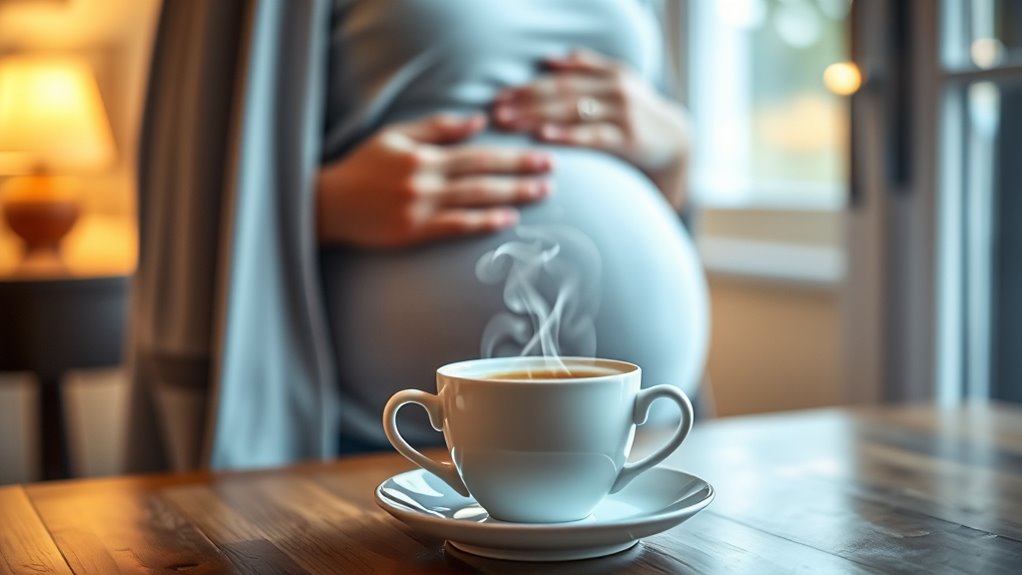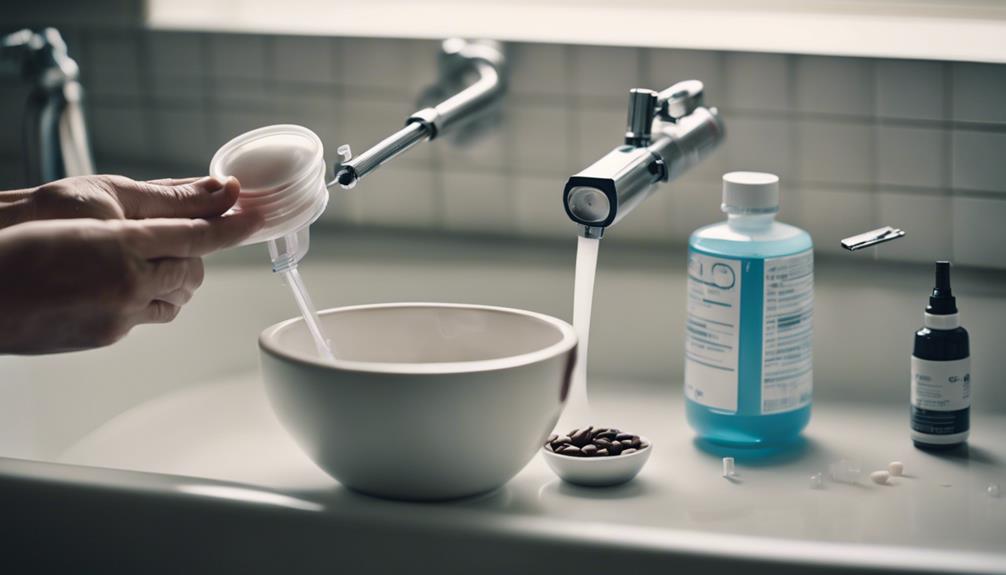During pregnancy, it’s safest to limit your caffeine intake to about 200 milligrams per day, roughly two cups of coffee. Excessive caffeine can cross the placenta and may impact fetal health, so choosing decaf or smaller servings helps. Be aware of different brewing and decaffeination methods, as some may contain residual chemicals. Staying within recommended limits supports your baby’s development, and exploring your options more thoroughly can guide you to healthier choices.
Key Takeaways
- Up to 200 mg of caffeine daily is generally considered safe during pregnancy.
- Moderate coffee consumption, about 1-2 cups per day, usually poses minimal risk.
- Excessive caffeine intake may increase the risk of miscarriage, preterm birth, or low birth weight.
- Choose decaffeinated coffee or lower-caffeine brewing methods to reduce intake.
- Always consult healthcare providers for personalized recommendations on caffeine limits during pregnancy.

Is drinking coffee safe during pregnancy? That’s a question many expecting moms ask, especially since caffeine is a stimulant that crosses the placental barrier. The good news is, moderate coffee consumption can be safe, but it’s essential to understand how different brewing methods and habits impact your health. When you visit a coffee shop, you might wonder about the best way to enjoy your favorite brew without risking your baby’s well-being. Coffee shop etiquette plays a role here—not just in manners, but in choices that affect caffeine intake. Opting for decaffeinated options or discussing your needs with baristas can help you manage your caffeine consumption responsibly.
Decaffeination methods are key to understanding what’s in your cup. There are several ways coffee gets decaffeinated, including Swiss Water Process, CO2 process, and solvent-based methods. The Swiss Water Process relies on water to remove caffeine, leaving behind a product that’s generally free of chemical residues. The CO2 method uses carbon dioxide to extract caffeine, resulting in a cleaner process. Solvent-based methods, on the other hand, involve chemicals like methylene chloride or ethyl acetate, which some pregnant women prefer to avoid. Knowing these methods helps you choose decaf coffee that aligns with your health priorities. Many cafes now offer decaffeinated coffee made through water or CO2 processes, giving you options that are safer and more natural.
When you’re out at a coffee shop, it’s helpful to be aware of coffee shop etiquette—especially if you’re requesting decaf or specific brewing methods. Politely asking your barista about the decaffeination process or how they prepare their coffee shows respect for their craft and ensures you’re making an informed choice. If you’re sensitive to caffeine or trying to limit your intake, don’t hesitate to ask for a smaller size or a different brewing method, like an espresso shot with less caffeine. Some cafes even offer half-caff options, blending regular and decaf beans to reduce caffeine content. This approach aligns with good coffee shop etiquette, as it fosters clear communication and helps you enjoy your coffee responsibly. Additionally, being aware of filtration methods can help you select coffees with fewer residual impurities, which is especially important during pregnancy. Moreover, understanding the technology behind decaffeination can assist in choosing options that are both safe and satisfying.
Frequently Asked Questions
Does Decaffeinated Coffee Pose Any Risks During Pregnancy?
Decaffeinated risks are a common concern, but generally, decaf coffee is considered safe during pregnancy. You might worry about residual caffeine or other chemicals used in decaffeination, but most methods remove caffeine effectively without adding risks. You can enjoy decaffeinated coffee as part of your routine, knowing it offers coffee safety without the high caffeine content. Just check labels for additives and opt for reputable brands to minimize concerns.
Can Caffeine Consumption Affect Fetal Development Differently in the First Trimester?
Imagine caffeine as a delicate thread weaving through your pregnancy fabric. During the first trimester, it can influence fetal brain development and placental blood flow, subtly altering the pattern. Excess caffeine may tighten this thread, restricting essential nutrients and oxygen. By being mindful of your intake, you help guarantee this early stitch remains strong, supporting your baby’s growth and a healthy beginning.
Are There Specific Types of Coffee to Avoid When Pregnant?
You might wonder if some coffee types are better during pregnancy. While decaffeinated coffee reduces caffeine risks, it still contains trace amounts that could affect your baby. It’s best to stick with coffee type recommendations like limiting brewed or instant coffee, and avoiding flavored or specialty drinks high in sugar and additives. Always check labels and consult your healthcare provider to guarantee you’re making safe choices for both you and your baby.
How Does Coffee Intake Influence Pregnancy-Related Complications?
They say “an ounce of prevention is worth a pound of cure,” and your coffee intake can influence pregnancy-related complications. Drinking too much caffeine may increase risks like gestational hypertension and preterm labor. Moderation is key; limiting your intake helps protect your pregnancy’s health. By staying mindful of your caffeine consumption, you’re actively supporting a safer, healthier pregnancy for you and your baby.
Is There a Safe Daily Caffeine Limit for Pregnant Women?
You might wonder if there’s a safe caffeine limit daily. Experts generally recommend pregnant women keep caffeine intake under 200 mg, roughly the amount in one 12-ounce coffee brewed with your preferred method. This helps prevent caffeine withdrawal symptoms and reduces risks. Remember, brewing methods like espresso or French press can affect caffeine levels, so adjust your intake accordingly to stay within safe limits during pregnancy.
Conclusion
Remember, moderation is key when it comes to coffee and pregnancy. Most experts agree that up to 200 mg of caffeine daily is safe, which is about one 12-ounce cup. Notably, a study found that women who consumed this amount had no increased risk of miscarriage. So, enjoy your favorite brew, but keep an eye on your intake. Stay informed and consult your healthcare provider to keep both you and your baby healthy and happy.









